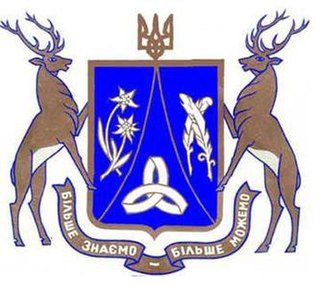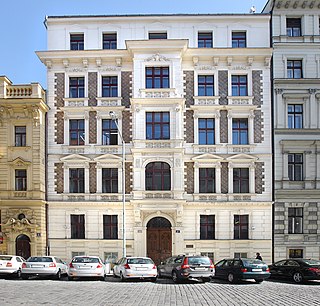Related Research Articles

A rector is a senior official in an educational institution, and can refer to an official in either a university or a secondary school. Outside the English-speaking world the rector is often the most senior official in a university, whilst in the United States the most senior official is often referred to as president and in the United Kingdom and Commonwealth of Nations the most senior official is the chancellor, whose office is primarily ceremonial and titular. The term and office of a rector can be referred to as a rectorate. The title is used widely in universities in Europe and is very common in Latin American countries. It is also used in Brunei, Macau, Turkey, Russia, Pakistan, the Philippines, Indonesia, Israel and the Middle East. In the ancient universities of Scotland the office is sometimes referred to as Lord Rector, is the third most senior official, and is usually responsible for chairing the University Court.
The title of docent is conferred by some European universities to denote a specific academic appointment within a set structure of academic ranks at or below the full professor rank, similar to a British readership, a French maître de conférences (MCF), and equal to or above the title of associate professor.
The title of reader in the United Kingdom and some universities in the Commonwealth of Nations, for example India, Australia and New Zealand, denotes an appointment for a senior academic with a distinguished international reputation in research or scholarship.

The University of New York in Prague (UNYP) is a private higher education institution in Prague, Czech Republic. It was established in 1998 in cooperation with the State University of New York at New Paltz and Empire State University, both part of the State University of New York (SUNY). UNYP was recognized by the Czech Ministry of Education, Youth and Sports in 2001 on the basis of accreditation of its study programs in Business Administration and International European Relations. UNYP is a member of the British Accreditation Council for Independent Further and Higher Education.

Uzhhorod National University is a Ukrainian state higher educational institution in the city of Uzhhorod in Ukraine.

Jan Hron is a Czech agroscientist, University Professor and former Rector of the Czech University of Life Sciences Prague (CULS).
This article describes the academic positions and ranks in Sweden.
The following are academic ranks in the Finnish higher education system. There are a specific number of posts, which can be applied to when they are vacated or established.

The Faculty of Social Sciences (FSS) is one of the newest faculties of Charles University. The Faculty was founded in 1990, shortly after the Velvet Revolution. It soon became a regional centre of teaching and research in area studies, economics, international relations, journalism, media studies, sociology and political science. The Faculty offers bachelor's, master's, and doctoral degree programs in social sciences. While the languages of instruction are Czech and English, students can choose from classes in a wide range of other languages, including French, German, Russian and Spanish.
Academic ranks in Spain are the titles, relative importance and authority of professors, researchers, and administrative personnel held in academia.
Academic ranks in Germany are the titles, relative importance and power of professors, researchers, and administrative personnel held in academia.
Academic ranks in Norway are the system of merit-based ranks used by academic employees in academia. Similar to the British rank system, the Norwegian rank system is broadly divided into three pathways, a combined research and teaching career pathway, a research career pathway and a teaching career pathway.
Academic ranks in South Africa are the titles, relative importance and power of professors, researchers, and administrative personnel held in academia.
Academic ranks in Russia are the conferred titles, indicating relative importance and power of professors, researchers, and administrative personnel in Russian academia and scientific institutions. The rank “certifies” the demonstrated ability of an individual to function in the specific academic position(s).
Academic ranks in Colombia are the titles, relative importance and power of professors, researchers, and administrative personnel held in academia.
Academic ranks in Denmark are the positions and titles of professors, researchers, and administrative personnel held in academia at Danish institutions, and the relations between them.
Academic ranks in Malaysia are the titles, relative importance and power of professors, researchers, and administrative personnel held in academia. Generally, Malaysia uses Commonwealth academic ranks. However, there are universities using their own academic titles.
Vladimir Vasilievich Uzhva is a Russian educator, currently employed as Vice-rector at National Research Nuclear University MEPhI.

Ari Kuncoro is an Indonesian banker, economist, author and university administrator, and the current rector of the University of Indonesia. He took office on 4 December 2019, succeeding Muhammad Anis. Before becoming the rector of the University of Indonesia (UI), Ari taught at the Faculty of Economics and Business, becoming the faculty's dean from 2013 until 2019. Ari also held the office of chief commissioner of the Bank Negara Indonesia since 2017 and continued to held the office after his election as rector. Ari ended his term as chief commissioner in February 2020 and assumed the office of deputy chief commissioner of the Bank Rakyat Indonesia (BRI) in the same year. His new post sparked protests from the university's internal, who demanded him to resign from his position in BRI as it violated the university statute. In response to this, the government removed the limitations from the university statute in a controversial amendment, but Ari later resigned from his position in BRI in July 2021.
References
- ↑ "Accreditation Commission". Msmt.cz. Retrieved 2014-11-11.
- ↑ "Mšmt Čr". Msmt.cz. Retrieved 2013-08-16.
- 1 2 "The Higher Education Act". Msmt.cz. Archived from the original on 2011-02-09.